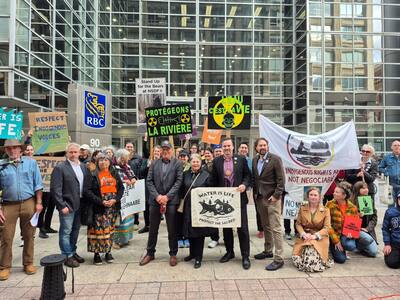The Bloc Québécois is calling for an immediate end to the dumping of radioactive waste into the Chalk River, located at the edge of the source of drinking water for millions of Quebecers.
The request, sent to Energy and Natural Resources Minister Tim Hodgson, follows a series of reports from our Bureau of Investigation, which was given rare access to the Canadian Nuclear Laboratories (CNL) site where the waste is stored.
Last year, the laboratory received 62.8 tons of irradiated uranium from the Gentilly-1 nuclear power plant in Bécancourt. This dangerous material is stored in about ten giant reinforced concrete bunkers in the middle of the forest, along the banks of the Ottawa River.
The least contaminated materials are stored side by side in containers stacked on top of each other.
More silos and containers need to be added because CNL also wants to dismantle two other federal nuclear power plants, in Ontario and Manitoba, and return the waste back to Chalk River, they explained to us.
Risk of environmental disaster
“This is probably one of the worst possible and conceivable places to store nuclear waste,” says the Bloc Québécois, which fears an “environmental and environmental disaster.”
CNL points out that the storage facility is only temporary: the silos are eventually to be placed in a geological storage facility more than 650 meters deep that is due to open by 2050 in northwestern Ontario.
But for Lance Haymond, chief of the Kebaowek First Nation, whose traditional territory includes CNL, the opening of the geological repository remains hypothetical because construction hasn't even begun yet.
The project is expected to cost $26 billion. Chief Haymond fears that the federal government does not have the funds to cover such a bill in a time of budget cuts and is therefore abandoning the Chalk River bunkers.
A long legal battle lies ahead
As for less contaminated waste accumulated in containers, LNK wants to bury it directly on the territory a kilometer from the river. But the Kebaoweks are blocking the project in court.
They won the battle at first instance, but the battle continues as Ottawa took the case to the Court of Appeal. Hearings began in early October. Lance Haymond, who is supported by the Assembly of First Nations of Quebec-Labrador and the Assembly of First Nations of Canada, promises to take the matter to the supreme court if necessary.
Therefore, the conflict will most likely drag on for many years. In the meantime, no matter what the courts ultimately decide, the accumulation of trash in the Chalk River must stop, says the Bloc Québécois.









